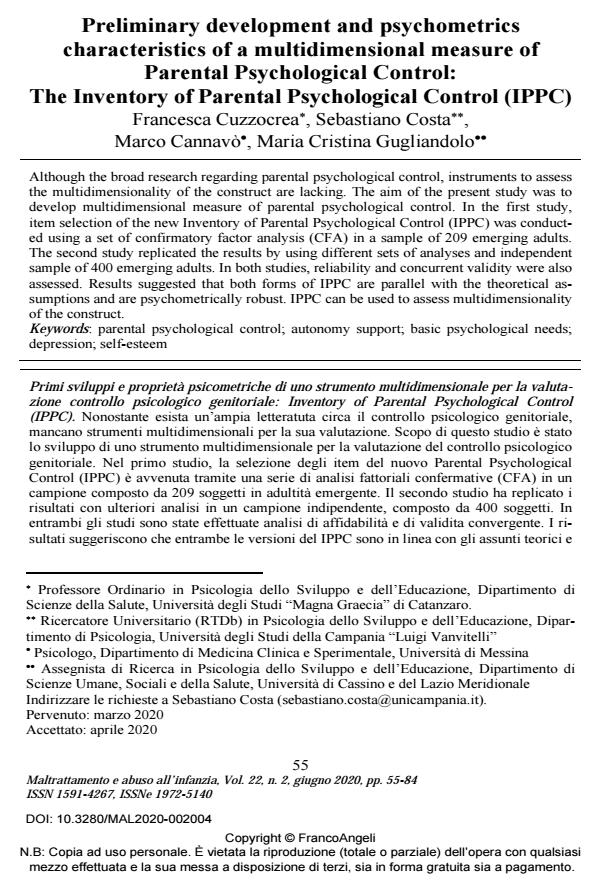Preliminary development and psychometrics characteristics of a multidimensional measure of Parental Psychological Control: The Inventory of Parental Psychological Control (IPPC)
Journal title MALTRATTAMENTO E ABUSO ALL’INFANZIA
Author/s Francesca Cuzzocrea, Sebastiano Costa, Marco Cannavò, Maria Cristina Gugliandolo
Publishing Year 2020 Issue 2020/2
Language English Pages 30 P. 55-84 File size 411 KB
DOI 10.3280/MAL2020-002004
DOI is like a bar code for intellectual property: to have more infomation
click here
Below, you can see the article first page
If you want to buy this article in PDF format, you can do it, following the instructions to buy download credits

FrancoAngeli is member of Publishers International Linking Association, Inc (PILA), a not-for-profit association which run the CrossRef service enabling links to and from online scholarly content.
Although the broad research regarding parental psychological control, instruments to assess the multidimensionality of the construct are lacking. The aim of the present study was to de-velop multidimensional measure of parental psychological control. In the first study, item se-lection of the new Inventory of Parental Psychological Control (IPPC) was conducted using a set of confirmatory factor analysis (CFA) in a sample of 209 emerging adults. The second study replicated the results by using different sets of analyses and independent sample of 400 emerging adults. In both studies, reliability and concurrent validity were also assessed. Re-sults suggested that both forms of IPPC are parallel with the theoretical assumptions and are psychometrically robust. IPPC can be used to assess multidimensionality of the construct.
Keywords: Parental psychological control; autonomy support; basic psychological needs; depression; self-esteem
- The Mediating Role of Dispositional Optimism and Perfectionism on the Relationship Between Perceived Parental Psychological Control and Support and Adolescents’ Well-Being Luana Sorrenti, Maria Imbesi, Carmelo Francesco Meduri, Angelo Fumia, Pina Filippello, in European Journal of Investigation in Health, Psychology and Education /2025 pp.160
DOI: 10.3390/ejihpe15080160 - Alexithymia in a Self Determination Theory Framework: The interplay of Psychological Basic Needs, Parental Autonomy Support and Psychological Control Nadia Barberis, Marco Cannavò, Francesca Cuzzocrea, Valeria Verrastro, in Journal of Child and Family Studies /2023 pp.2652
DOI: 10.1007/s10826-022-02303-3 - Parental psychological control and school engagement in adolescents: A longitudinal study Federica Papa, Francesco Preiti, Sebastiano Costa, in MALTRATTAMENTO E ABUSO ALL'INFANZIA 3/2024 pp.61
DOI: 10.3280/MAL2024-003003
Francesca Cuzzocrea, Sebastiano Costa, Marco Cannavò, Maria Cristina Gugliandolo, Preliminary development and psychometrics characteristics of a multidimensional measure of Parental Psychological Control: The Inventory of Parental Psychological Control (IPPC) in "MALTRATTAMENTO E ABUSO ALL’INFANZIA" 2/2020, pp 55-84, DOI: 10.3280/MAL2020-002004